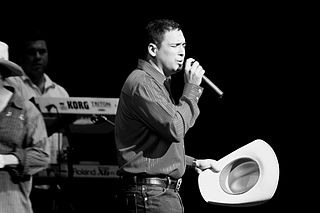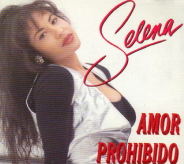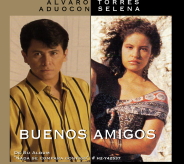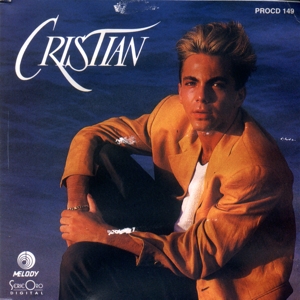
Jose Roberto Pulido Jr., known professionally as Bobby Pulido, is an American singer, songwriter, guitarist, and actor. He is acclaimed for pioneering the dissemination of Tejano music to a youthful audience, subsequently ascending as a teen idol and becoming one of the most influential Tejano recording artists among Mexican-American teenagers.

Amor Prohibido is the fourth studio album by American singer Selena, released on March 22, 1994, by EMI Latin. Having reached a core fan base, the label aimed to broaden her appeal with the next studio release. Finding it challenging to write a follow-up hit after "Como la Flor" (1992), Selena's brother A. B. Quintanilla enlisted the assistance from band members Ricky Vela and Pete Astudillo with writing the album's songs. The resulting album has a more mature sound featuring experimental production that blends diverse musical styles from ranchera to hip-hop music. Amor Prohibido is a Tejano cumbia album modernized with a synthesizer-rich delivery using a minimalist style that was quintessential in early 1990s Tejano music.

Segundo Romance is the tenth studio album by Mexican singer Luis Miguel, released on 30 August 1994 through WEA Latina. Like Miguel's 1991 album Romance, Segundo Romance comprises cover versions of boleros written between 1934 and 1993. It was produced by Miguel with Juan Carlos Calderón, Kiko Cibrian and Armando Manzanero and recorded in early 1994 at the Record Plant in Los Angeles.

All My Hits: Todos Mis Éxitos Vol. 2 is a greatest hits album by American singer Selena that was released on February 29, 2000, through EMI Latin. After Selena's murder in 1995, her father Abraham Quintanilla stated his commitment to preserving her music and EMI Latin pledged ongoing support for her releases. In 1999, the label's president José Behar acknowledged Selena, who remained the label's top-selling artist, for her contributions to establishing EMI Latin as "the house that Selena built". In March 1999, to commemorate the label's tenth anniversary, it released All My Hits: Todos Mis Éxitos; it achieved commercial success and a sequel was announced. All My Hits: Todos Mis Éxitos Vol. 2 contains 16 songs ranging from tracks featured on Selena's Muñequito de Trapo (1987) to the posthumous 1997 club remix of "Enamorada de Ti" (1990).

Ones is a compilation album by American singer Selena, released in the United States on October 1, 2002 by EMI Latin. It was released on November 11, 2002 in Spanish-speaking countries, while the limited edition included a bonus DVD of her music videos. Ones was released building on the popularity of the 1997 biographical film Selena. The album was aimed at Selena's new generation of fans, and its release marked the singer's twentieth year in the music industry. Ones features six number one singles namely, "Amor Prohibido", "Bidi Bidi Bom Bom", "No Me Queda Más", "Fotos y Recuerdos", and her duets with Álvaro Torres on "Buenos Amigos" and the Barrio Boyzz on "Donde Quiera Que Estés".
Selena ¡Vive! was a benefit concert which was held on the tenth anniversary of the death of Tejano superstar Selena Quintanilla-Pérez. The concert was held on April 7, 2005 at the Reliant Stadium in Houston, Texas with over 70,000 attendees. The special was produced and filmed by the Spanish language network, Univision, and was the most-watched special in the Spanish language in the history of American television. Event host Univision announced that proceeds from "¡Selena Vive!" will go toward 10 scholarships for students looking to pursue higher education at Texas universities.

Todo a Su Tiempo is the second studio album by American recording artist Marc Anthony, released by RMM Records on May 31, 1995. The album was produced by Sergio George, who was also involved with production of Anthony's debut studio album, Otra Nota. The album comprises five new compositions, three of which were written by Omar Alfanno, and four cover versions. Eight singles were released from the album, all but one of which topped the Billboard Tropical Songs chart.

"Amor Prohibido" is the title song of American Tejano singer Selena's fourth studio album of the same name (1994). Released as the lead single through EMI Latin on April 13, 1994, it was written by Selena, her brother and music producer A.B. Quintanilla III, and her band's backup vocalist Pete Astudillo. A popular interpretation compares it to Romeo and Juliet.
Latin R&B is a style of R&B that originated in Latin America and the United States. It is a musical subgenre of American contemporary R&B and Latin soul that also takes influence from dancehall. The genre began to gain popularity in the late 2010s and has since spread throughout Latin America.

"Buenos Amigos" is a down-tempo, pop ballad duet recorded by Salvadoran recording artist Álvaro Torres and American recording artist Selena for Torres' sixth studio album Nada Se Compara Contigo (1991). The song was released by EMI Latin in 1992, as the album's second single. Its lyrics explore a friendship built on the strong, unrequited feelings of the male narrator. Torres composed "Buenos Amigos" after attending a showcase event at which Selena was performing.

"Donde Quiera Que Estés" is a duet recorded by American Latin pop quintet the Barrio Boyzz and American Tejano singer Selena. Released on the Barrio Boyzz' album of the same name, "Donde Quiera Que Estés" was written by K. C. Porter, Miguel Flores, Desmond Child, and produced by A.B. Quintanilla III, Domingo Padilla and Bebu Silvetti. The lyrics explore feelings felt after a breakup between first-time lovers who hope that their love will one day return. "Donde Quiera Que Estés" is a dance pop song with influences from hip-hop music.

"Nunca Voy a Olvidarte" is a song written by Roberto Belester and first recorded by Mexican grupero band Bronco for their album Salvaje y Tierno (1991). In the song, the protagonist is leaving and vows to never forget the time he spent with his lover. In 1993, Mexican singer-songwriter Cristian Castro covered the song on his album, Un Segundo en el Tiempo. Castro's version peaked at number-one on the Billboard Hot Latin Songs chart in the United States became his first number-one single.
American singer Selena released twenty-four official singles, seven promotional singles. Her career began as the lead vocalist of Los Dinos in 1980. Her albums with Los Dinos on indie labels failed to achieve any chart success. In 1987, her remake of Ritchie Valens' "La Bamba" peaked at number 19 on the United States Billboard Hot Latin Songs chart, her first entry. She signed with EMI Latin nine years later as a solo artist though her band continued to tour with her. Selena appeared on "Buenos Amigos" with Salvadoran singer Álvaro Torres. The track peaked at number one on the U.S. Hot Latin Songs chart in 1991, the singer's first number one song. Subsequent singles, "Baila Esta Cumbia" and "Como la Flor", became popular songs on Mexican radio, with "Como la Flor" launching the singer's career in that country. "Como la Flor" peaked at number six on the Hot Latin Songs chart, despite popular culture claims that it was the singer's first number one single. The track has charted on the U.S. Regional Mexican Digital Songs list since its inception in 2010 and remains the singer's signature number and most popular recording.
The discography of American Latin rap band The Barrio Boyzz consists of seven studio albums, five compilation albums, one holiday album, fourteen singles and four music videos. The Barrio Boyzz was formed in 1991 by Joe Jacket, who proposed creating a mainstream Latino group. They auditioned for chairman of EMI Records, Charles Koppelman, who signed the group to its sister label SBK Records. The group's debut album, Crazy Coolin' (1992), failed to make any impact on music charts, but its lead single "Muy Suavemente" peaked at number 36 on the US Billboard Hot Latin Tracks chart. Their second studio album, Donde Quiera Que Estes (1994) reached the top 20 on Billboard's Latin charts. The album spawned three singles; "Cerca De Ti" and "Te Amaré", which peaked at number one and number 16 on the Hot Latin Tracks, respectively. The titular single, a duet with American Tejano pop singer Selena, peaked at number one and was logged atop the Hot Latin Tracks chart for six consecutive weeks.

"Mañana, Mañana" is a song written by Mexican singer-songwriter Juan Gabriel. Argentine singer Libertad Lamarque performed the song in the Mexican movie La loca de los milagros. Juan Gabriel released his recording of the song, a duet with Estela Nuñez, on his album Ella (1979). The song describes the departure of a lost love who will never return.

"Una Vez Mas" is a song by Latin pop group the Barrio Boyzz for their third studio album of the same name. It was written by Marco Flores and KC Porter, while the latter produced the piece. The song was released as the lead single by EMI Latin in 1995. The recording received a positive reception from music critics. The single peaked at number two on the US Billboard Latin Pop Songs chart, number five on the US Top Latin Songs chart, and number eight on the US Tropical Songs chart.

Lo Mejor de...Selena is a double disc compilation album by American singer Selena. It was released posthumously in the United States on March 31, 2015, by Capitol Latin and Universal Music Latin Entertainment. The album was released after the commercial and chart success of Enamorada de Ti (2012), which featured several Latin music acts lending their voices for the remix album. The recording features six number one United States Billboard Hot Latin Songs chart singles by the singer—"Buenos Amigos", "Donde Quiera Que Estés", "Amor Prohibido", "Bidi Bidi Bom Bom", "No Me Queda Más", "Fotos y Recuerdos", and the US Billboard Latin Pop Airplay chart single "I Could Fall in Love".
This is a list of notable events in Latin music that took place in 1994.
"Te Amaré" is a song performed by Latin pop boy band The Barrio Boyzz and written by one of its band members, Angel Ramirez, on their second studio album Donde Quiera Que Estés (1993). It peaked at number 16 on the Hot Latin Songs chart.














